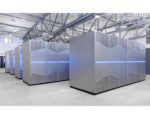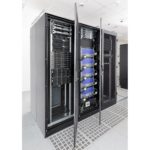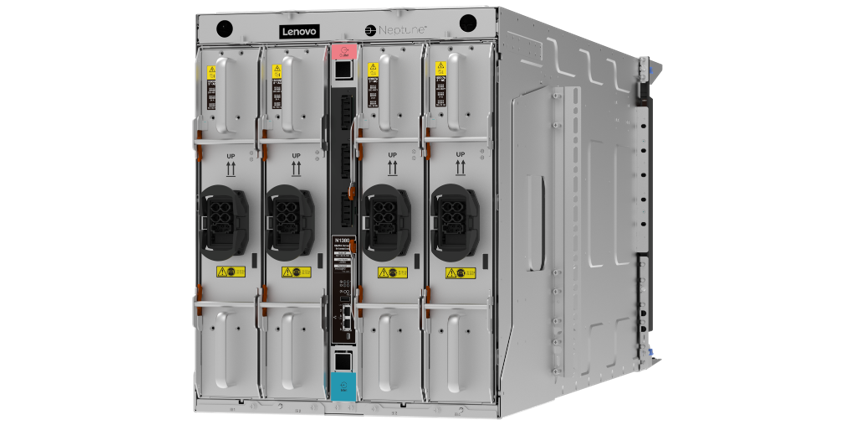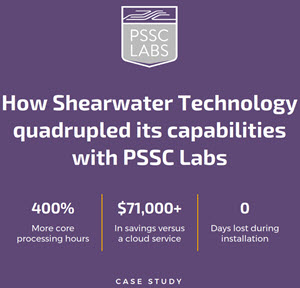Dec. 2, 2024 — The Jülich Supercomputing Centre (JSC) at Forschungszentrum Jülich in Germany received a 100-qubit quantum computer from neutral atom quantum computing company Pasqal in mid-November.
Installation Starts at JSC for Jupiter, Europe’s First Exascale HPC
The Jülich Supercomputing Centre in Germany announced the start of installation for Europe’s first exascale-class supercomputer, Jupiter. The first containers of the modular data center for the have been positioned ….
Eviden to Deliver Modular Data Center for Europe’s 1st Exascale System
This morning, Eviden made it official: it has been awarded a contract by Jülich Supercomputing Centre in Germany to build the modular data center to host the EuroHPC JUPITER supercomputer, Europe’s first exascale system. This is not surprising because….
Atos Launches First Supercomputer Equipped with NVIDIA A100 GPU
Today Atos announced its new BullSequana X2415, the first supercomputer in Europe to integrate NVIDIA’s Ampere next-generation graphics processing unit architecture, the NVIDIA A100 Tensor Core GPU. This new supercomputer blade will deliver unprecedented computing power to boost application performance for HPC and AI workloads, tackling the challenges of the exascale era. The BullSequana X2415 blade will increase computing power by more than 2X and optimize energy consumption thanks to Atos’ 100% highly efficient water-cooled patented DLC (Direct Liquid Cooling) solution, which uses warm water to cool the machine.
Video: High-Performance Computing with Python – Reducing Bottlenecks
This course addresses scientists with a working knowledge of NumPy who wish to explore the productivity gains made possible by Python for HPC. “We will show how Python can be used on parallel architectures and how to optimize critical parts of the kernel using various tools. The following topics will be covered: – Interactive parallel programming with IPython – Profiling and optimization – High-performance NumPy – Just-in-time compilation with Numba – Distributed-memory parallel programming with Python and MPI – Bindings to other programming languages and HPC libraries – Interfaces to GPUs.”
Job of the Week: Postdoctoral scholar position for terrestrial systems modeling at Jülich Supercomputing Centre
The Jülich supercomputing Centre in Germany is seeking a Postdoctoral scholar position in the field of terrestrial systems modeling. “You will setup and perform large scale terrestrial systems simulations over the European continent based on novel climate change scenarios and story lines. The simulation results will be analyzed using advanced data analytics technologies to inform various sectors in order to formulate adaptation strategies.”
Modular Supercomputing Moves Forward in Europe
In this video from ISC 2019, Thomas Lippert from the Jülich Supercomputing Centre describes how modular supercomputing is paving the way forward for HPC in Europe. “The Modular Supercomputer Architecture (MSA) is an innovative approach to build High-Performance Computing (HPC) and High-Performance Data Analytics (HPDA) systems by coupling various compute modules, following a building-block principle. Each module is tailored to the needs of a specific group of applications, and all modules together behave as a single machine.”
Jülich Supercomputing Centre Announces Quantum Computing Research Partnership with Google
Today the Jülich Supercomputing Centre announced it is partnering with Google in the field of quantum computing research. The partnership will include joint research and expert trainings in the fields of quantum technologies and quantum algorithms and the mutual use of quantum hardware. “The German research center will operate and make publicly accessible a European quantum computer with 50 to 100 superconducting qubits, to be developed within the EU’s Quantum Flagship Program, a large-scale initiative in the field of quantum technologies funded at the 1 billion € level on a 10 years timescale.”
Jülich installs first Cluster Module for DEEP-EST Exascale Project
Researchers at the Jülich Supercomputing Centre have installed the first-ever Cluster Module from MEGWARE as part of the European DEEP-EST project for Exascale computing. The Cluster Module consist of a single rack with 50 Intel Xeon Scalable Processor-based dual-socket nodes with a Mellanox EDR-InfiniBand 100Gbps high-performance cluster fabric. “The DEEP-EST prototype will demonstrate that a Modular Supercomputer is much more flexible than a monolithic one, and matches very diverse application profiles in a cost-effective way.”













